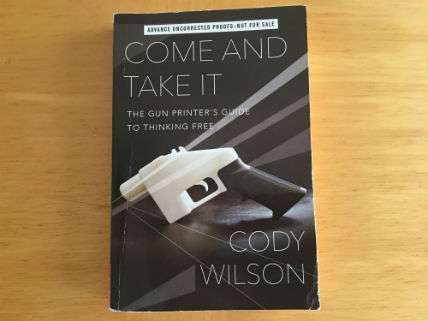How To Print a Gun at Home: Ronald Bailey Reviews 'Come and Take It' at WSJ
Is plastic gun printer Cody Wilson an 'open source terrorist' or a free speech hero?

In the Wall Street Journal today, I review Cody Wilson's new book, Come and Take It: The Gun Printer's Guide to Thinking Free. Wilson became notorious when he launched the effort by his non-profit Defense Distributed to create and then supply online the digital files for using a 3-D printer to make guns at home. His new book almost diaristically details that saga and the opposition and relentless fearmongering that his project has faced from government agencies and progressive pundits and politicians.
Wilson takes his title from the Gonzales Flag used by American colonists when they fought the first battle for Texas independence from Mexico. Featuring an image of the cannon the colonists refused to hand over to Mexican troops the flag is emblazoned with the slogan "Come and Take It." On his website, Wilson replaced the cannon with an image of a RepRap printer.
Excerpts from the WSJ review:
Do you have a right to download and use the digital instructions to print out a gun? In September, a three-judge panel of the U.S. Court of Appeals for the Fifth Circuit ruled, 2 to 1, that you don't. The author of "Come and Take It," Cody Wilson, runs the nonprofit Defense Distributed, which was the losing plaintiff in that case. Mr. Wilson asserts that the printing instructions are protected by the First Amendment as free speech. In a sense, the court ruling is an answer to the author's challenge to "come and take it."
The Feds want to ban the guns and the digital instructions for making them.
Just how could the federal agencies actually enforce such a ban? Put firmware locks on the printers? Ban digital file sharing? Require that manufacturers of 3-D printers install some kind of feature that prevents gun-part printing? As digital-rights activist Cory Doctorow, who is no fan of Mr. Wilson's, has observed: "Every one of those measures is a nonsense and worse: unworkable combinations of authoritarianism, censorship, and wishful thinking. Importantly, none of these would prevent people from manufacturing plastic guns. And all of these measures would grossly interfere with the lawful operation of 3D printers."…
Judge Edith Jones, in her powerful [Fifth Circuit] dissent, observed that "the denial of a temporary injunction in this case will encourage the State Department to threaten and harass publishers of similar non-classified information." She further declared that "interference with First Amendment rights for any period of time, even for short periods, constitutes irreparable injury." During a talk in 2013, Mr. Wilson declared that his digital gun-design project "is working so well because it confuses the stakes for free-speech liberals and command-and-control liberals. The files themselves are a powerful species of political speech. And how do we know they are political speech? Because the're being fought so strongly." Sadly, free-speech liberals seem mostly absent in this fight.
Go here to read the whole WSJ review.
For more background see below my Reason TV colleague Todd Krainin's documentary, "Cody Wilson: Happiness Is A 3-D Printed Gun."


Show Comments (27)